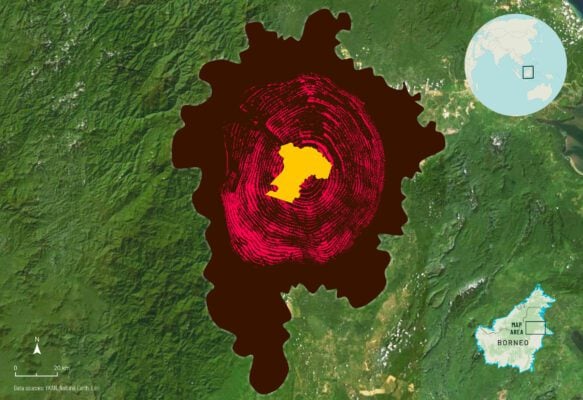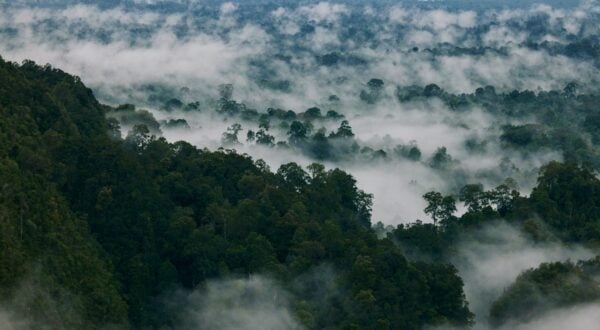Borneo, an island off the coast of southeast Asia, may seem like a world away from Indiana, but the fate of its rainforests, wildlife and ecosystems has direct, life-altering consequences for Hoosiers.
As part of a global fight to safeguard our planet, the efforts by The Nature Conservancy (TNC) to protect Borneo’s biodiversity could help preserve Indiana’s own natural heritage, including its air, water and wildlife.
Borneo, one of Earth’s most biologically rich regions, plays a vital role in stabilizing the global climate and maintaining biodiversity. Its rainforests act as carbon sinks, soaking up vast amounts of carbon dioxide and helping to regulate weather patterns that reach Indiana.

Tropical forests on Earth hold nearly 50% of nature’s carbon stocks, yet 5-10% of these stocks are lost every year, according to Jan Glendening, the executive vice president of TNC.
“(Borneo’s rainforests) are some of the oldest rainforests in the world,” Glendening said. “These forests store tremendous amounts of carbon. They play a key role in mitigating climate change and shelter hundreds, if not thousands, of unique species like the Bornean orangutan.”
TNC is partnering with local Indonesian government, indigenous communities and forward-thinking companies to advance their efforts to preserve and conserve the rainforests, which are under threat from palm oil development, timber harvesting and mining.
“Unfortunately, other than timber, most of the value that people have been deriving from Borneo has been from clearing the forest,” said Eddie Game, lead scientist and director of conservation for the Asia Pacific Region at TNC.
TNC’s focus is on the Kalimantan, one of the countries in Borneo, because that’s where the “biggest and best” remaining forests are, according to Game. TNC has helped those efforts for over 25 years.

“Whenever we lose a tropical forest in a place that’s as highly threatened as Borneo, we’re going to lose so much of our planet’s ability to regulate climate, and so protecting these areas, ensuring they’re there for future generations, not only people in Borneo, but also for the people of the world, would mean we lose some of the most important ecosystems for climate health,” said Jennifer Morris, chief executive officer of TNC.
Game maintains that Borneo’s rainforests are crucial to help prevent drastic climate change consequences, a problem that expands beyond borders and can directly affect Hoosiers at home.
A study by Purdue University reports that climate change will bring higher temperatures, intense heat waves, more frequent storms and more heat events. Human health will be directly impacted through the spread of tropical diseases, threat of heat stroke and detrimental mental health impacts as a result of severe weather events.
TNC’s work centers around the forestry companies who have rights to harvest timber in specific areas. As Game describes, many of the companies have abandoned their sites, creating large vacant areas for people to come in and begin clearing.

“Our bold approach was to go and find some of these inactive timber concessions in really important places, places that were critical for biodiversity and near the frontier of forest clearing and buy them and reoperate them,” Game said. “The concession that we currently own is 100,000 acres. We’re going to conserve half of it, not log it.”
TNC’s goal is to have a ring of managed concessions surrounding a preservation, conserving the forest and creating a sustainable forestry management system that helps keep the area up for many generations to come and helps prevent drastic climate change affects that continued misuse would cause.
For more information about TNC and to support their efforts, visit nature.org.
This reporting is made possible by a grant from the Indianapolis African-American Quality of Life Initiative, empowering our community with essential health insights. https://iaaqli.org/
Contact Health & Environmental Reporter Hanna Rauworth at 317-762-7854 or follow her on Instagram at @hanna.rauworth.
Hanna Rauworth is the Health & Environmental Reporter for the Indianapolis Recorder Newspaper, where she covers topics at the intersection of public health, environmental issues, and community impact. With a commitment to storytelling that informs and empowers, she strives to highlight the challenges and solutions shaping the well-being of Indianapolis residents.










